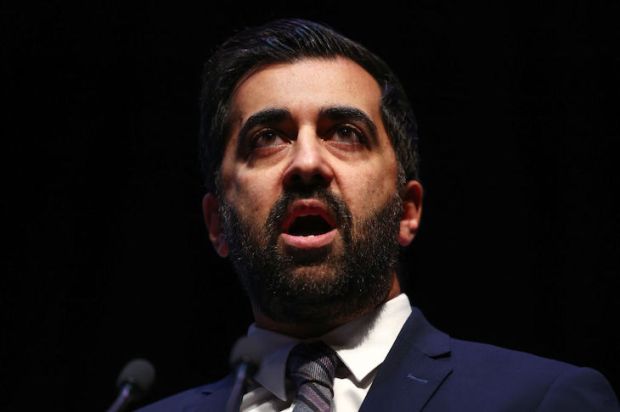I laughed aloud when I heard Gianni Infantino, president of Fifa, identifying himself sanctimoniously with a whole list of disadvantaged people because he too was a victim: he was teased at school for having ginger hair.
I had teenage spots, so can I claim unique insight into the sufferings of the Uighurs? That some of those he listed owed their disadvantage to Qatar and its Fifa partner – exploited migrant workers, notably, and gay fans – seemed not to disturb his tranquil assumption of the moral high ground. In its rambling incoherence, shameless narcissism and bare-faced hypocrisy, his speech put its finger on some of the key absurdities of what passes for progressive ethics in 2022.
Most obvious, of course, is the self-indulgent claim to victimhood, so popular today among all who wish to banish any suspicion that their privileges might not be wholly deserved. Infantino is reportedly paid around £3 million a year to head one of the world’s most shamelessly amoral and corrupt organisations. To date, thousands of migrant workers have died helping build Qatar’s world-cup infrastructure. How might their families view Infantino’s touching claim to trichological underprivilege?
Victorian missionaries and colonial officers were far less demanding and impatient than today’s ‘decolonial’ absolutists
Infantino had another shot in his locker: blaming the West. This is now becoming known as ‘decoloniality’, all-embracing in its moral vacuousness. You cannot criticise Qatar for being bigoted and oppressive, says Infantino, because Europe is guilty of 3,000 years of wrongdoing – since around the time of the Trojan Wars, presumably. Here we see one of the shadiest elements of the ‘decolonising’ trend propagated across the West: it provides a facile excuse for evading responsibility. Corrupt and incompetent post-colonial elites can blame their failings on ‘colonialism’. They may even seek ‘reparations’ despite often having made things far worse since independence.
In this blame-shifting they are aided by decolonising intellectuals, teachers and bureaucrats in the West. In a rush for self-righteousness and peer approval, or just in panic from fear of being accused of racism, they are all too often eager to join in trashing their own cultures and distorting history. Decoloniality has come to mean the rejection of almost every aspect of our culture as being founded on racism, exploitation and colonialism. Targets now include not only history (British empire = racism), art and literature (Jane Austen = slavery) but more fundamentally mathematics (a ‘colonial construct’), physics (for neglecting ‘indigenous spirituality’) and even computer science (sorry, I have no idea why).
At the very least, this so muddies the waters, especially in the minds of the young who have been exposed to these influences at school, that basic moral judgment becomes a problem. The debilitating ‘moral equivalence’ that some of us remember from Cold War days (‘the West is just as bad as the Communists’) has now morphed into ‘the West is worse than everyone else’. Opinion polls show a waning commitment to Western values of democracy and freedom among the under 30s. This suits those such as Infantino, who would like to silence criticism of Fifa’s conduct. Far more importantly, it also serves criminal and aggressive dictators who see Western democracy, with all its faults, as a danger and an enemy. What saps democracy strengthens them.
Yet Infantino, perhaps unwittingly, did bring out at least one contradiction among his and Qatar’s critics. The loudest criticism has not focused primarily on the deplorable treatment of migrant workers. Instead, most anger appears to be felt because Qatar does not recognise gay and trans rights. Yet the most fervent supporters of these rights are invariably enthusiasts for ‘decolonisation’: two inseparable parts of the progressive package. They think the West’s cardinal sin is to have tried to impose on other cultures not just its system of government but its own view of reality – hence the push to ‘decolonise’ even maths and science as forms of colonial oppression.
But what could be more exclusively Western than today’s progressive views about sex, gender and identity? What could be more imperialistic than the universal imposition of these values by multinational corporations, publicity-hungry celebrities and taxpayer-subsidised lobbies? To insist on the West’s latest obsession being adopted immediately and unconditionally across the globe is cultural colonialism at its most uncompromising. Victorian missionaries and colonial officers were far less demanding and impatient than today’s ‘decolonial’ absolutists.
You can condemn ‘coloniality’, or you can condemn sexual conservatism in Qatar. You cannot honestly do both. The whole legal scaffolding of human rights is a twentieth-century Western invention dating from the last years of the colonial era, when the West thought it had a right and duty to lead. So thank you, Infantino, for showing us that ‘decolonisation’ – whether practised by idealists or by con men – means throwing away the idea of universal human rights.
The post Fifa’s president has exposed the trouble with ‘decoloniality’ appeared first on The Spectator.
Got something to add? Join the discussion and comment below.
Get 10 issues for just $10
Subscribe to The Spectator Australia today for the next 10 magazine issues, plus full online access, for just $10.



















Comments
Don't miss out
Join the conversation with other Spectator Australia readers. Subscribe to leave a comment.
SUBSCRIBEAlready a subscriber? Log in